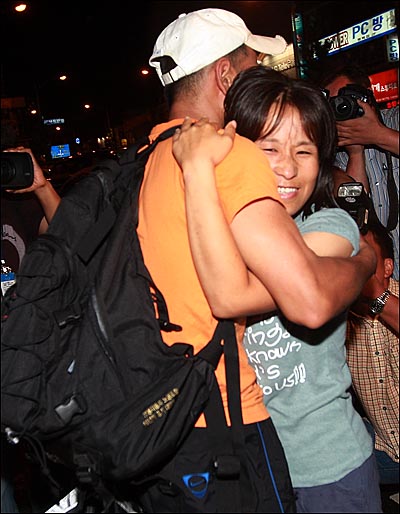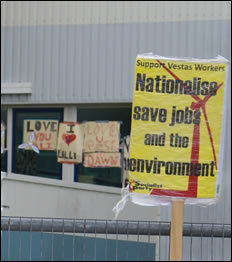
[See also South Korea: Graphic photos, video -- Ssangyong sit-in workers' appeal: `Our lives are at stake'.]
By Young-su Won
August 6, 2009 -- After days of harsh and inhumane assaults by riot police and company thugs on striking workers occupying the Ssangyong Motor plant in Pyeongtaek, near Seoul, the Korean Metal Workers Union (KMWU) and management reached an agreement: the union accepted part of the company’s redundancy proposal, saving about half the strikers’ jobs, while the rest will apply for voluntary retirement or unpaid long-term leave, or accept another job with the spin-off company.

Hiroshima and Nagasaki: Worst single terror attacks in history

[For more background information, go to http://links.org.au/node/1168 and http://links.org.au/node/1175.]
Ventnor Blog -- August 5, 6pm, 2009 -- With Mike Godley having left yesterday, we spoke to Mark, one of the six who are still inside at the Vestas sit-in. We discussed how they had to reorganise themselves now four people have left.
He said that that morale was still good and how they’ll “still be fighting Vestas”. Mark explained that “It was strange to have that many people leaving at once.”
It’s unclear if Vestas have applied for bailiff papers to have them removed from the building. Vestas have issued a statement that they are very patient and that they can wait. Mark said, “They did ask us yesterday that if we wanted to leave the door open they would come in and get us. We replied ‘No’.”
(For best results: allow video to load on `pause' before pressing play.)
Urgent appeal by the Korean Metal Workers Union and Korean Confederation of Trade Unions
The Economist forced to back down over lies on Venezuela and Bolivia

By Francisco Dominguez
Venezuela: `The democratisation of the mass media has begun'

By Kiraz Janicke

Avril Boyne, more than eight months' pregnant, who has nine years' service at Thomas Cook, protesting at the closure of the travel agency and the redundancy package offered to staff at the Thomas Cook office, Grafton Street, Dublin. Thomas Cook is offering five weeks' pay for each year of service but workers are holding out for eight weeks. Photograph by Matt Kavanagh/Irish Times.
* * *
STOP PRESS: Thomas Cook sit-in raided by police, workers arrested!
Send protest/solidarity emails to wendy@thomascook.ie and fennj@tssa.org.uk
Public ownership of coal industry needed to move to 100% renewable energy and retain jobs

With Honduras, with all of Latin America -- sign the statement
July 31, 2009 -- We, the undersigned social, political and solidarity organisations, faced with the ongoing coup d’état in Honduras and the imperialist project of installing military bases in Colombia whose objective is to throttle the hope for liberty and emancipation across the Latin American continent,
Declare:
1. Our complete support for the immediate and unrestricted return of President Manuel Zelaya and the restitution of constitutional order, without conditions, to Honduras. Furthermore, we demand the punishment of those responsible for the coup d’état and the recognition of people’s sovereignty to freely decide their future, through referendum, consultation or any other means of participative democracy.
2. We denounce the cynicism shown by the US government and its satellites in the Organisation of America States, with an attitude which speaks of the recognition of the constitutionality of Zelaya’s Presidency at the same time as they reach agreements and hold conversations with the organisers of the coup, and carry out all types of delaying tactics with the objective of demobilising the impressive resistance movement which has been awakened in the interior of Honduras, coordinated in the National Resistance Front against the Coup.
Malaysia: 40,000 demand `Abolish the Internal Security Act now!', hundreds arrested
By S. Arutchelvan
August 1, 2009 -- Parti Sosialis Malaysia -- The 40,000-strong mobilisation today in Kuala Lumpur and the thousands who did not make it because of police roadblocks gave a very clear and precise message to Malaysia's Prime Minister Datuk Seri Najib Razak: repeal the draconian Internal Security Act (ISA).
Venezuela: Class struggle intensifies over battle for workers’ control
.jpg)
By Federico Fuentes
Caracas -- July 25, 2009 -- On July 22, Venezuelan President Hugo Chavez again declared his complete support for the proposal by industrial workers for a new model of production based on workers’ control.
This push from Chavez, part of the socialist revolution, aims at transforming Venezuela’s basic industry. However, it faces resistance from within the state bureaucracy and the revolutionary movement. Presenting his government’s “Plan Socialist Guayana 2009-2019”, Chavez said the state-owned companies in basic industry have to be transformed into “socialist companies”.
The plan was the result of several weeks of intense discussion among revolutionary workers from the Venezuelan Corporation of Guayana (CVG). The CVG includes 15 state-owned companies in the industrial Guayana region involved in steel, iron ore, mineral and aluminium production.
The workers’ roundtables were established after a May 21 workshop, where industrial workers raised radical proposals for the socialist transformation of basic industry. Chavez addressed the workshop in support of many of the proposals.
A balance sheet of the European elections

By François Sabado